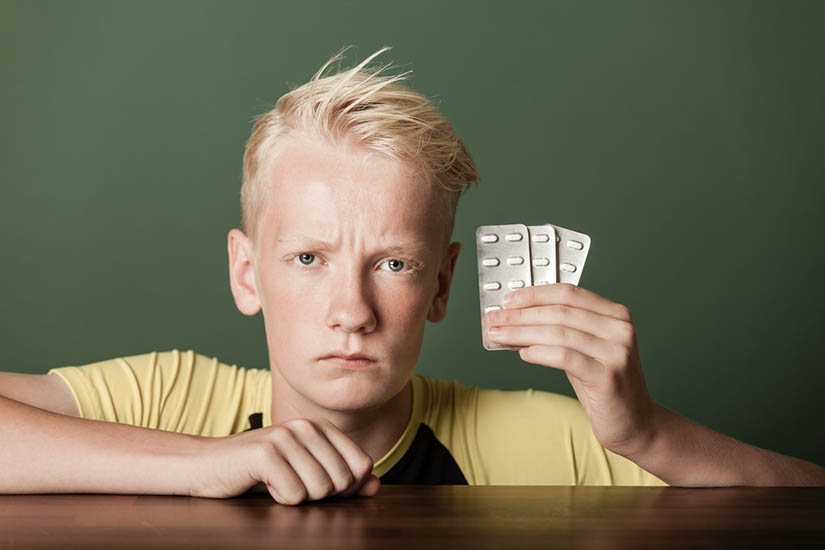Risk of Depression Spikes When Kids Take Ritalin
孩子服用利他林時抑鬱風險急劇上升
Risk of depression increased when children were taking methylphenidate for ADHD, but once they stopped taking the drug, depression risk dropped to normal levels.
當孩子服用哌甲酯(利他林)治療 ADHD 時,抑鬱症風險會增加,但一旦他們停止服藥,抑鬱風險會降至正常水平。
By Peter Simons – May 30, 2022
彼得·西蒙斯 撰 – 2022 年 5 月 30 日
In a new study, researchers found that when kids were taking Ritalin (methylphenidate), their risk of depression increased. Once they stopped taking the drug, their depression risk dropped back to normal levels.
“Our findings suggest that use of methylphenidate medication in young people with ADHD is temporally associated with the emergence of depression. With the increased global use of ADHD drugs, the benefits of methylphenidate should be carefully evaluated against the potential risk of depression in children and adolescents,” the researchers write.
在一項新的研究中,研究人員發現,當孩子服用利他林(哌甲酯)時,他們的抑鬱風險會增加。一旦他們停止服用該藥物,他們的抑鬱風險就會回到正常水平。
“我們的研究結果表明,在患有 ADHD 的年輕人中,使用哌甲酯藥物與抑鬱症的出現存在時間上的相關性。隨著全球 ADHD 藥物使用的增加,應在評估哌甲酯益處的同時,謹慎考慮其對兒童和青少年抑鬱風險的潛在影響。”研究人員寫道。
The researchers were Yunhye Oh and Yoo-Sook Joung at South Korea’s National Center for Mental Health, and Jinseob Kim at Seoul National University, South Korea. Their analysis included the medical records for the entire population of South Korea.
The participants included 2,330 youth (ages 6-19) who received a diagnosis of ADHD and methylphenidate prescription between July and December 2007. They included data on ADHD medication, depression diagnoses, and antidepressant medication. The researchers used a case-control design to establish when, relative to stimulant prescription, depression risk spiked.
They found that depression risk first increased just before kids were prescribed Ritalin—possibly indicating the same struggles at home and in school that led to a diagnosis of ADHD. In the 90 days before being prescribed Ritalin, kids were about 12 times more likely to receive a diagnosis of depression than their “healthy” peers.
The kids were then given Ritalin, presumably with the hope that it would control ADHD symptoms, and thus improve the kids’ overall quality of life.
But the prescription seemed to have the opposite effect. While taking the stimulant drug, kids risk of depression spiked to more than 18 times that of their “healthy” peers.
研究人員是韓國國家精神健康中心的吳允惠(Yunhye Oh)和鄭侑淑(Yoo-Sook Joung),以及首爾國立大學的金鎮燮(Jinseob Kim)。他們的分析包括了整個韓國人口的醫療記錄。
研究參與者包括 2,330 名 6 至 19 歲之間的青少年,他們在 2007 年 7 月至 12 月之間被診斷為 ADHD 並獲得哌甲酯(利他林)的處方。數據包括 ADHD 藥物使用、抑鬱診斷和抗抑鬱藥物使用情況。研究人員使用病例對照設計來確定抑鬱風險相對於興奮劑處方的時間點。
他們發現,抑鬱風險首次增加的時間是在孩子們被處方利他林之前,這可能表明導致 ADHD 診斷的家庭和學校中的相同問題。在被處方利他林之前的 90 天內,孩子們被診斷為抑鬱症的可能性是“健康”同齡人的 12 倍。
孩子們隨後被開具了利他林,推測目的是控制 ADHD 症狀,從而改善孩子的整體生活質量。
但這個處方似乎產生了相反的效果。服用這種興奮劑藥物時,孩子的抑鬱風險激增,達到“健康”同齡人的 18 倍以上。
This could still be driven by underlying depression risk continuing to increase despite the drug, though. However, once kids stopped taking Ritalin, their risk of getting a depression diagnosis dropped down to a level equal to that of their “healthy” peers.
The researchers found that once kids were no longer taking the stimulant medication, their risk of depression began to fall. By 30-60 days after discontinuation, they were no more likely to be depressed than their peers who had no mental health problems.
Although their results could theoretically still be driven by confounding factors, the strong case-control design and the finding that depression risk dropped after discontinuing the drug make a causal relationship between Ritalin and depression more likely.
Although previous studies have found mixed evidence, with some finding no connection, but others supporting this effect, it’s possible that the current study’s stronger design was better able to capture the full picture. Animal studies also support this finding of Ritalin-induced depression, as in a study concluding that rodents exposed to Ritalin “were significantly less responsive to natural rewards such as sucrose, novelty-induced activity, and sex.”
The most well-regarded and highly cited study of childhood ADHD, the NIMH’s MTA study, found promising initial results, which were published widely in the mass media and led to the belief that stimulants were extremely effective for ADHD treatment. However, later results of the MTA study were dismal: the three-year follow-up found that those receiving treatment were no better off than those who did not, while the six-to-eight-year follow-up found that those who received medication did no better than those who did not. By that follow-up, none of the treatments had been successful: the children who received treatment still scored worse than the normative comparison group on 91% of the measures they tested.
儘管如此,這種現象可能仍是由潛在的抑鬱風險驅動的,即使服用藥物,這一風險仍在增加。然而,一旦孩子停止服用利他林,他們被診斷為抑鬱症的風險就下降到與“健康”同齡人相同的水平。
研究人員發現,一旦孩子不再服用興奮劑藥物,他們的抑鬱風險開始下降。在停藥 30-60 天後,他們患抑鬱症的可能性與那些沒有心理健康問題的同齡人一樣。
儘管理論上他們的結果仍可能由混雜因素驅動,但這種強有力的病例對照設計,以及發現抑鬱風險在停藥後下降,讓利他林與抑鬱之間的因果關係變得更加可能。
儘管先前的研究結果不一,有些未發現任何聯繫,但也有研究支持這一效應。這次研究的強大設計可能更好地捕捉到了完整的情況。動物研究也支持這一發現,正如一項研究得出的結論那樣,接觸過利他林的老鼠“對於諸如蔗糖、新奇活動和性行為等自然獎勵的反應顯著減弱。”
最受推崇且引用最多的兒童 ADHD 研究,即美國國家精神衛生研究所(NIMH)的 MTA 研究,最初顯示出令人鼓舞的結果,這些結果被廣泛報導,並促使人們相信興奮劑對 ADHD 治療非常有效。然而,MTA 研究的後續結果卻令人失望:三年後的跟進發現,接受治療的孩子與未接受治療的孩子沒有任何差別;而在六到八年的跟進中,發現接受藥物治療的孩子並不比未接受治療的孩子更好。在那次跟進中,沒有任何治療顯示出成功:接受治療的孩子在所測試的 91% 的指標上仍然比正常對照組表現更差。
Oh, Y., Joung, Y. S., & Kim, J. (2022). Association between attention deficit hyperactivity disorder medication and depression: A 10-year follow-up self-controlled case study. Clinical Psychopharmacology and Neuroscience, 20(2), 320-329. (Full text)
Editor’s Note: The description of the six-to-eight year results of the MTA study was edited for clarity.
Oh, Y., Joung, Y. S., & Kim, J. (2022). Association between attention deficit hyperactivity disorder medication and depression: A 10-year follow-up self-controlled case study. Clinical Psychopharmacology and Neuroscience, 20(2), 320-329. (Full text)
編者註:為了更清晰的表述,對 MTA 研究六至八年結果的描述進行了編輯。
